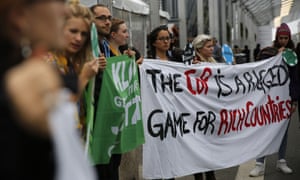Extract from The Guardian
Calls by the US and Australia for tougher
requirements on how developing countries’ emissions are reported on
and checked have met with fierce resistance
Protesters outside the COP 21 climate talks in
Paris holding a sign claiming the process is rigged in favour of rich
countries. A divide between the demands of developing and developed
nations is emerging over emissions reporting and checking rules.
Photograph: Christophe Ena/AP
Lenore
Taylor in Paris
Friday 4 December 2015 07.01 AEDT
Buried in the detail of the Paris
Accord could be some innocuous-looking words that will have a
powerful impact on whether it ever delivers the greenhouse gas
reductions it promises.
The words could “paper over” deep divisions
about whether countries ever have to properly report and account for
the promised emission reductions that collectively limit global
warming to the already-dangerous
2.7 degrees.
Key to the negotiations will be a trade off
between developing countries’ demands for financing to reduce their
own emissions and adapt to locked-in climate change and the
insistence by both rich nations like the United States and
climate-vulnerable countries like the small island states that every
country should be required to at least work towards the same rules
for reporting and checking their emission reductions.
Since the pledges in the Paris Accord will not be
legally binding and the more stringent rules applied to developed
countries under the Kyoto Protocol are almost certain to lapse in
five years, the direction set for this new set of reporting and
checking rules is important to ensure the agreement delivers what it
promises for the climate.
Countries like India claim the existing rules
under the overarching UN framework convention on climate change are
fine.
Dr Ajay Mathur, director general of the Bureau
of Energy Efficiency in Delhi, said there was “no need to spend
time again negotiating new reporting guidelines and rules when we
already have rules that apply to everybody and give necessary
flexibility to developing countries.”
But those rules have far softer requirements for
how and what developing countries report about their emission
reductions. They do not require comprehensive reporting and do not
force countries to detail how they are tracking towards the target
they have pledged or to project their future greenhouse gas
emissions. And the system for “expert review” of developing
country reports is far less onerous than the in-country checking for
developed nations.
Bill Hare, chief executive of Climate Analytics,
said allowing the current system to continue was “not feasible”
and would represent a “complete failure at the Paris talks”.
“It would mean we couldn’t check or track what
developing countries are doing,” he said. “There would be no way
of knowing what was happening.”
Transparency is a “red line” issue for
countries like the United States and Australia. They are willing for
common requirements to be phased in and for poor countries to get
extra help to develop the systems they need to comply with the new
rules, but are determined that the goal must be a common system.
It would not include penalties or have any means
to force compliance, but it would – eventually – provide a
reasonably clear picture of what emissions reductions each country
had achieved.
And that, in turn, would create the trust
necessary for countries to increase the ambition of their emission
reduction targets over time, to bring global emissions to the level
that might contain warming to 2 degrees or lower.
President Obama made America’s position clear in
his Paris speech.
“Here in Paris, let’s agree to a strong system
of transparency that gives each of us the confidence that all of us
are meeting our commitments. And let’s make sure that the countries
who don’t yet have the full capacity to report on their targets
receive the support that they need,” he said.
But developing countries like India and Saudi
Arabia are adamant different reporting rules are enshrined in the
1992 convention’s recognition of the principle of “differentiation”
between the responsibilities placed on rich and poor nations.
In his speech to the conference, Indian prime
minister Narendra Modi said a “common but differentiated”
responsibility had to “remain the bedrock” of the agreement
because anything else would be morally wrong.
The US has said it “would not support a
bifurcated approach to the new agreement, particularly one based on
groupings that may have made sense in 1992 but that are clearly not
rational or workable in the post‐2020 era”.
Nozipho Mxakato-Diseko, ambassador from South
Africa and chair of the G77+China negotiating bloc said
differentiation was “embedded ... and we should not have to
renegotiate it here.”
She objected to the “narrative” on
transparency rules that cast poor countries as “villains” and
also to the idea that rich countries’ promises on finance would be
conditional on poor countries’ acceptance of common transparency
rules.
“Conditionality erodes trust ... it is not a
responsible way to go,” she said.
The Paris Accord will not finalise the reporting
and review rules but it will set a direction. Rich countries want a
path to a credible, common system. The alternative is wording
papering over the fact that the current stand-off remains unresolved.
According to the deputy chief executive of The
Climate Institute, Erwin Jackson, “the danger in that outcome is
that we continue the procedural battle we are currently seeing
forever. It gives countries who want to weaken the process an
opportunity to continue to throw spanners in the works for years to
come.”
Richard Chatterton, head of climate policy for
Bloomberg New Energy Finance, said differentiation was the issue that
could “derail” the Paris talks.
He said the most likely outcome was the conference
would find “wording” that “effectively sweeps differentiation
under the carpet”, meaning it would be fought out for years to
come.

No comments:
Post a Comment